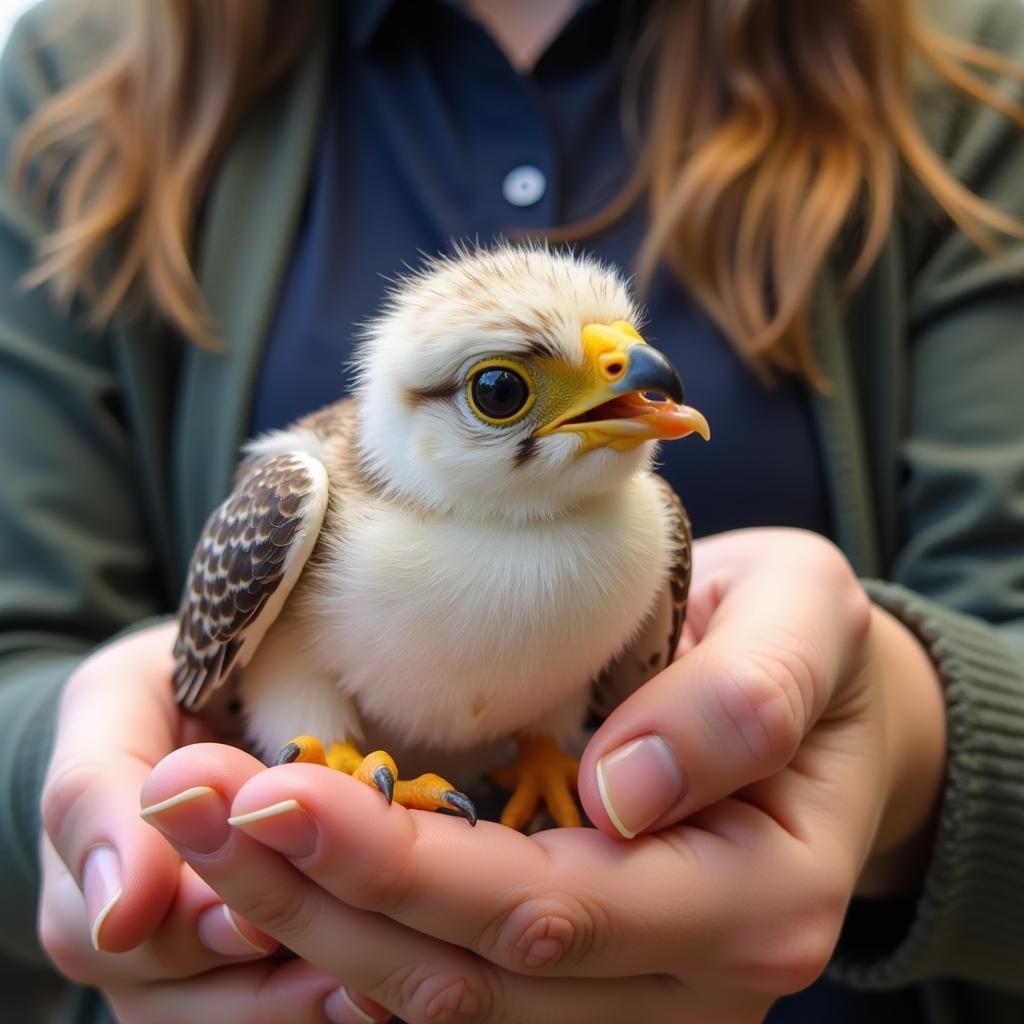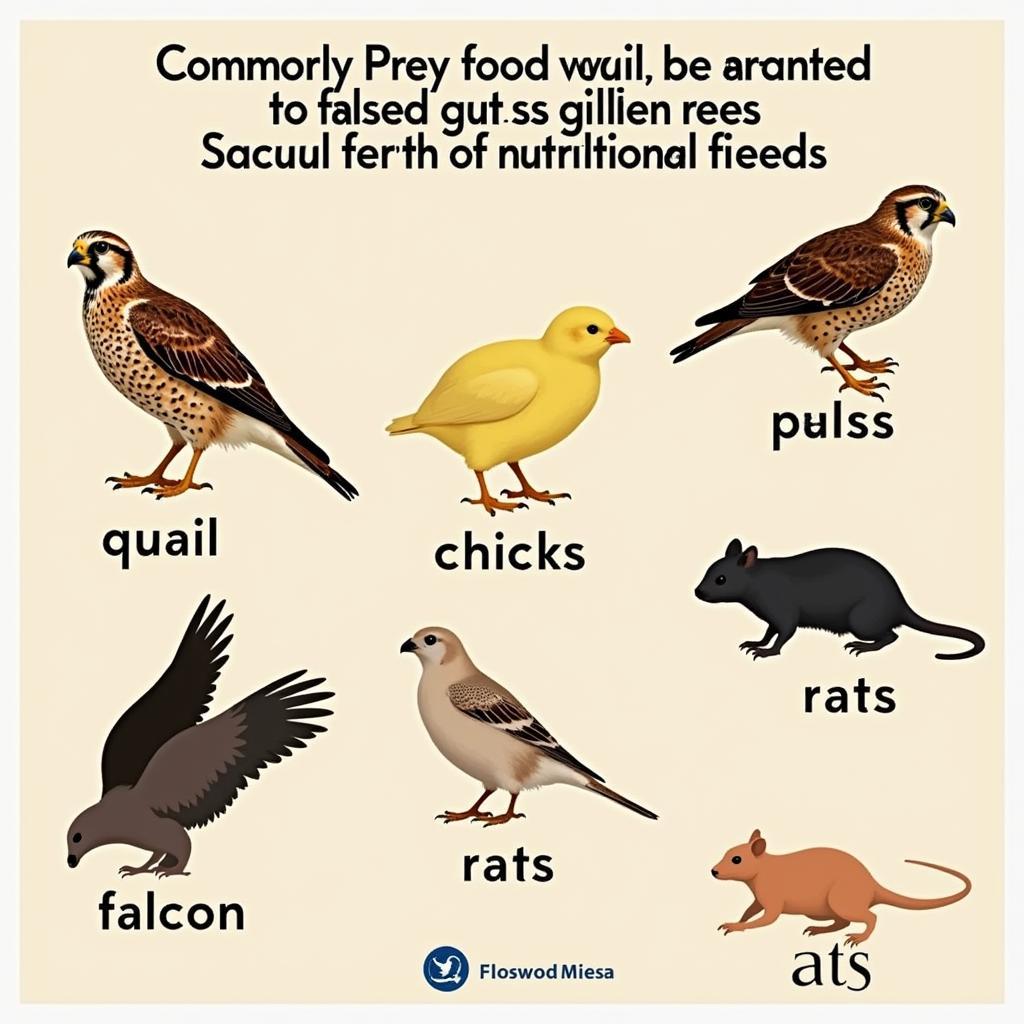Falconry Food, the sustenance that fuels these magnificent birds of prey, plays a crucial role in their health, performance, and overall well-being. Understanding the intricacies of a raptor’s dietary needs is essential for any falconer, ensuring their feathered companion thrives in captivity and performs optimally during hunts.
What Do Falcons Eat in the Wild and in Captivity?
In their natural habitat, falcons exhibit a diverse diet, primarily consisting of small to medium-sized birds, mammals, and occasionally reptiles. The specific prey varies depending on the falcon species and its geographical location. Peregrine falcons, for instance, are known for their breathtaking aerial hunts, targeting birds like pigeons, doves, and waterfowl. Smaller falcon species, such as the American kestrel, may focus on insects, rodents, and small reptiles.
Falconry food in captivity aims to replicate this natural diet as closely as possible. Falconers typically provide their birds with a variety of food items, including day-old chicks, quail, pigeons, and rats. The quantity and type of food are carefully adjusted based on the falcon’s size, species, activity level, and overall health.
 Day-old Chicks as Falconry Food
Day-old Chicks as Falconry Food
The Importance of a Balanced Falconry Food Diet
A balanced falconry food diet is paramount for maintaining a raptor’s health and vigor. Just like humans, falcons require a specific balance of nutrients, including proteins, fats, vitamins, and minerals, to thrive. A deficiency in any of these essential nutrients can lead to health problems, impacting the bird’s ability to hunt, fly, and reproduce.
For instance, a lack of calcium can lead to weak bones, increasing the risk of fractures during flights or hunts. Insufficient protein intake can result in muscle wasting and reduced energy levels, hindering the falcon’s performance. A well-balanced diet not only ensures physical health but also contributes to the bird’s mental well-being, promoting alertness, focus, and overall vitality.
Preparing Falconry Food: Key Considerations
Preparing falconry food involves more than simply providing a piece of meat. Falconers must carefully consider the quality, freshness, and preparation methods to ensure optimal nutrition and prevent the transmission of diseases. Freezing prey items can help eliminate parasites and bacteria, while thawing should be done safely to prevent spoilage.
Some falconers choose to supplement their birds’ diet with vitamins and minerals, especially during periods of high activity or breeding. However, it’s crucial to consult with a veterinarian or experienced falconer before introducing any supplements, as improper supplementation can have detrimental effects.
How to Determine the Right Amount of Falconry Food
Determining the correct amount of falconry food for a falcon requires careful observation and adjustment. Overfeeding can lead to obesity and other health issues, while underfeeding can result in weakness and decreased performance. Falconers typically weigh their birds regularly to monitor their weight and adjust the food intake accordingly.
The amount of food also depends on the falcon’s activity level. A falcon that is actively hunting or training will require more food than a bird that is resting or molting. Experienced falconers develop a keen eye for assessing their bird’s condition and adjusting the diet as needed.
How much should I feed my falcon?
The amount of food you should feed your falcon depends on its species, size, age, and activity level. Consult with an experienced falconer or veterinarian for personalized advice.
Common Mistakes to Avoid in Falconry Food Management
One common mistake is feeding a falcon an exclusively monotonous diet. Variety is key to providing a full spectrum of nutrients. Another error is neglecting proper hygiene during food preparation, which can expose the bird to harmful bacteria or parasites.
Ignoring a falcon’s individual needs is another significant oversight. Each bird is unique, and their dietary requirements may vary based on their specific circumstances. Treating all falcons with a one-size-fits-all approach can lead to nutritional imbalances and health problems.
 Variety of Prey Items for Falconry Food
Variety of Prey Items for Falconry Food
Conclusion
Falconry food is a critical aspect of raptor care, directly impacting the bird’s health, performance, and overall well-being. By understanding the principles of a balanced diet, proper preparation techniques, and individual bird requirements, falconers can ensure their feathered companions thrive in captivity and continue to soar with grace and power. Remember, providing optimal falconry food is a testament to a falconer’s dedication and commitment to the well-being of these magnificent birds.
FAQ
- What is the best falconry food for beginners? Day-old chicks and quail are often recommended for beginners due to their ease of handling and availability.
- Can I feed my falcon wild-caught prey? It’s generally not recommended due to the risk of parasites and diseases.
- How often should I feed my falcon? Most falcons are fed once a day.
- What are the signs of an underfed falcon? Signs can include weight loss, lethargy, and decreased hunting performance.
- What should I do if my falcon refuses to eat? Consult with a veterinarian or experienced falconer.
- How do I store falconry food? Freeze prey items until needed and thaw safely before feeding.
- Where can I purchase falconry food? Specialty suppliers and some pet stores offer falconry food.
For further assistance, please contact us at Phone Number: 02437655121, Email: minacones@gmail.com Or visit us at: 3PGH+8R9, ĐT70A, thôn Trung, Bắc Từ Liêm, Hà Nội, Việt Nam. We have a 24/7 customer support team.